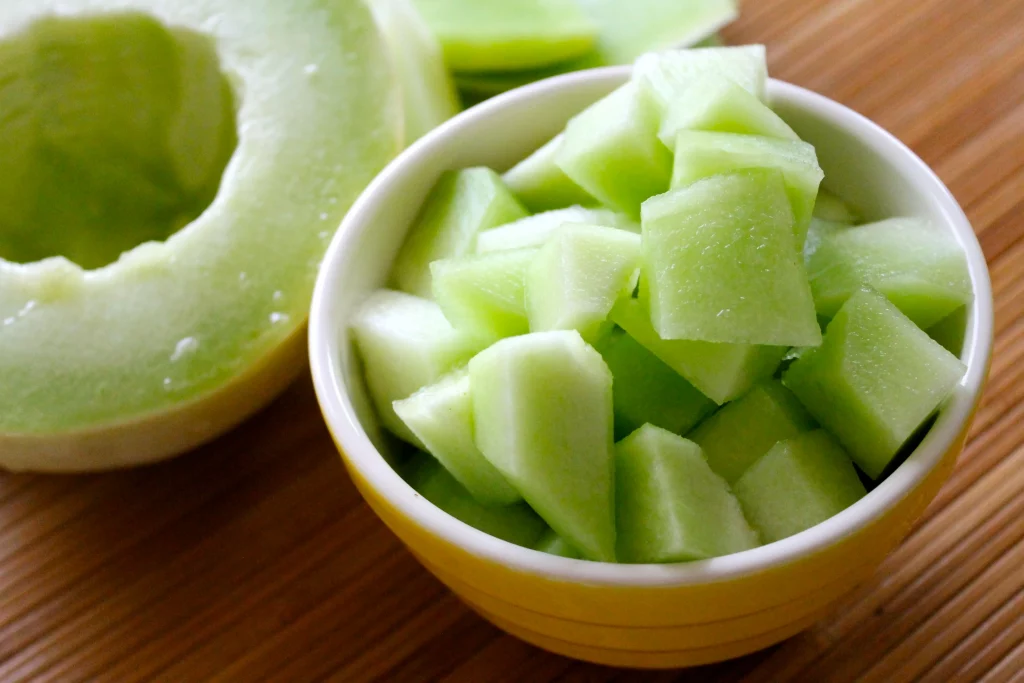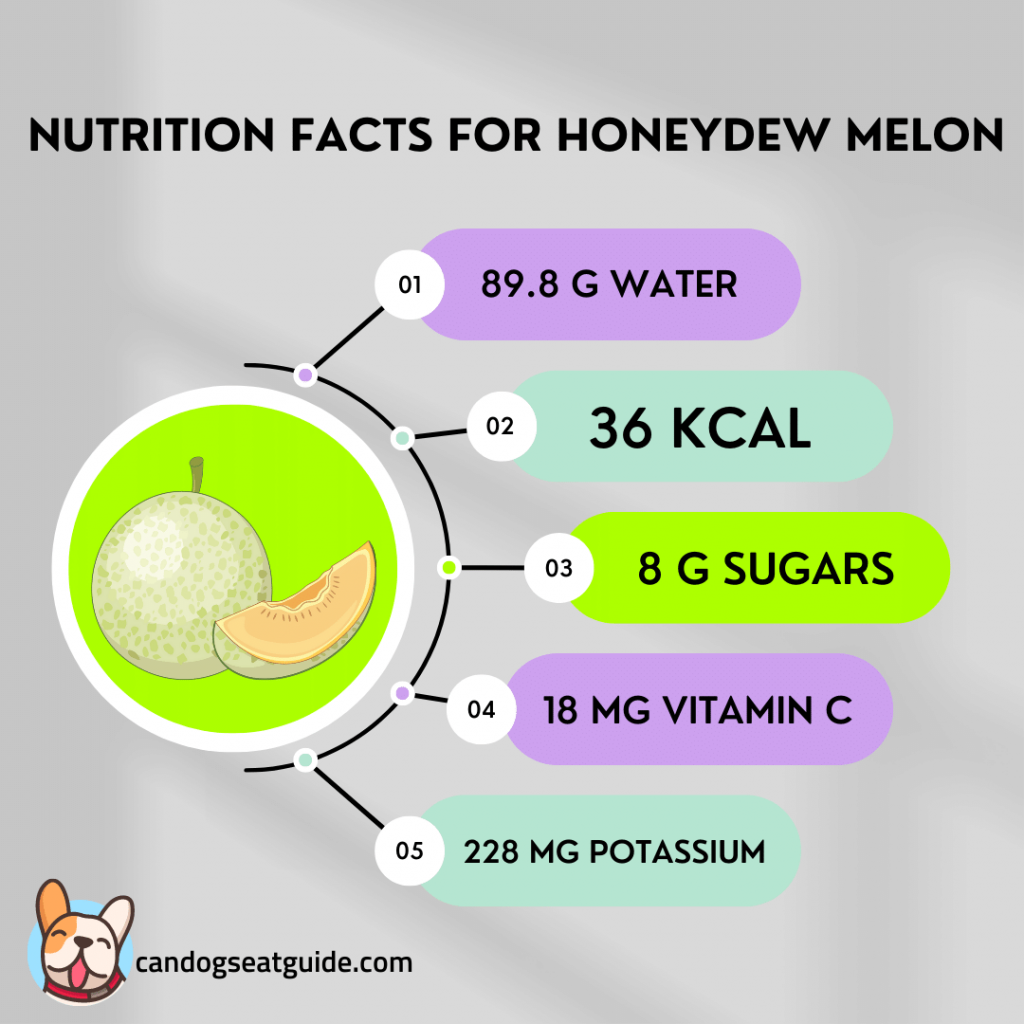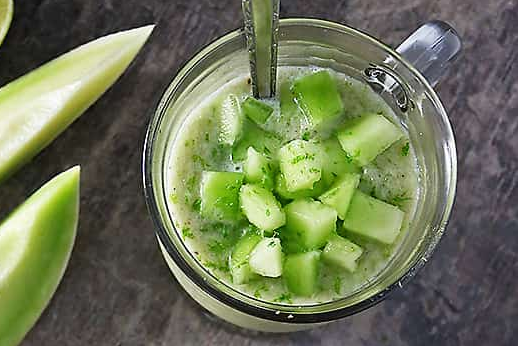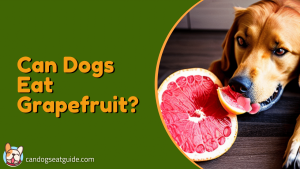Honeydew is a very delicious fruit, favorite to many people.
That’s why it’s normal on hot summer days while you are having it as a snack to wonder if can dogs eat honeydew melon.
Keep reading and you will find all information you need.
What is Honeydew?
Honeydew is a kind of melon with a very smooth rind and lacks the musky odor that is usual for the other types of melon. It has a round to slightly oval shape. The flesh of it is in pale green color, while the peel varies from greenish to yellow.
Honeydew melon is great for people with high blood pressure as it is a low-sodium and high-potassium fruit – this combination is known for lowering blood pressure.
Can Dogs Eat Honeydew?
Yes, dogs can eat honeydew.
Honeydew is safe for dogs if given in moderation and of course if dogs aren’t allergic to it. It can be given as a treat and it will give some needed nutrition for a healthy dog. It’s an excellent source of vitamin C, as with one cup humans get 56% of the recommended daily intake of it.

Honeydew is completely saved after removing seeds and rind. Honeydew melon is 90% of water which makes it a perfect summer snack for humans and dogs.
Why I Should Feed My Dog Honeydew Melon?
Honeydew can be a great nutrition for all dogs – no matter size, age, or breed. Here is a list of a few positives of giving a bit of honeydew to your dog:
- Rich in vitamins and minerals:
- It contains dietary fiber, potassium, phosphorus;
- It is a good source of vitamin A, vitamin B6;
- Has antioxidants like vitamin C and vitamin E;
- It’s low in calories:
- It will be a great snack for dogs that are trying to lose weight;
- Won’t cause weight gain;
- This plus dietary fiber makes the dog feel full faster;
- Great way to prevent overeating;
- Hydrates:
- 90% of the honeydew is water;
- It will make the dog hydrated for longer;
- It’s a great snack for dogs that don’t like to drink much water.
Why Dogs Shouldn’t Eat Honeydew Melon?
Actually, there aren’t any reasons that will point out that dogs shouldn’t eat honeydew. But there are a few things you can consider before giving your dog this sweet and delicious fruit.
- High levels of sugar:
- It will not be a good treat for diabetic dogs;
- It’s high in natural sugars which can increase blood sugar levels;
- But in small amounts the content of sugar isn’t dangerous;
- Can irritate the stomach:
- Every food has the chance of upsetting the stomach;
- That’s why when you add a new fruit or veggie to your dog’s diet, you should give a really small amount first and monitor if there will be any signs of irritation;
- Honeydew is safe for the stomachs of dogs if it is given in a small amount;
- Dogs shouldn’t eat the rinds of melon:
- As the skin of any other fruit, the rind of honeydew melon can be a choking hazard;
- Before giving honeydew to your dog ensure that the skin is peeled;
- Dogs shouldn’t eat the seeds:
- They can cause a choking hazard;
- They can irritate dogs’ stomachs.
How to Feed My Dog Honeydew?

Honeydew should be given in moderation, without any excessive amounts, not too often, without the seeds, and without the rind.
First, wash the honeydew melon.
Then, chop it into wedges. Use a sharp knife to cut the melon in half, and then slice these halves into wedges that are in the shape of the moon.
Remove the seeds and the rind. With a spoon or knife (what is easier for you) remove the seeds, then cut off the rind.
Chop into pieces. Pieces should be in small sizes – bite-sized is the best option. This way you will prevent choking but also make sure that the dog can’t eat too much of it.
Give it as a treat: A handful of honeydew is enough for your dog and you shouldn’t think even of giving more. Treats should be a maximum of 10% of the daily intake of calories.
You can put the melon in the fridge for a few hours or directly freeze it. It will be the best snack for you and your dog on hot summer days.
Can Dogs Eat Honeydew: Nutrition Aspects

- Minerals:
- Magnesium, phosphorous, zinc, and calcium support the health of bones;
- Magnesium is needed for the buildup and breakup of bone tissue;
- Antioxidants:
- There are traces of iron and copper that improve the health of red blood cells;
- Antioxidants fight the free radicals in dogs’ bodies and slow down the aging process;
- Vitamins:
- Honeydew contains vitamins C, K, and A. All together keep the immune system of dogs strong;
- Vitamin K is necessary for maintaining healthy bones – in honeydew, we can find a good amount of it;
- Carbohydrates:
- Contains 9 grams of carbs per 100 grams;
- Carbs can raise blood pressure;
- Fiber:
- Lowers blood pressure;
- Helps bowel movements and prevents constipation and diarrhea;
- Electrolytes:
- Honeydew contains electrolytes like potassium, sodium, magnesium, and calcium which in combination with the water make an excellent source of hydration for your doggo.
What To Do If My Dog Eats Too Much Honeydew?
Because of the dietary fiber that is present in honeydew, your dog may get diarrhea or vomiting because of the excessive amounts it had eaten.
It is not a good idea to give your dog too much honeydew at once as it’s a fruit – so it’s sweet and honeydew is the sweetest melon, it can cause diabetes and high blood sugar levels.
If your pooch eats a big amount of honey, you should monitor the signs and if in the next 24 hours the dog doesn’t get better, contact your vet.
Can Dogs Eat Honeydew: Dog-Friendly Recipes
1. Honeydoodle Dew
Recipe by Kiki Kane
Servings: 2

Ingredients:
- 1/2 cup of frozen honeydew melon;
- a small drop of honey;
- 1/4 goat milk;
- 2 mint leaves;
- optional: 1 mint leaf for garnish.
Instructions:
- Finely dice the mint leaves. Put them into the blender.
- Add the honeydew melon, honey, and milk. Blend until smooth.
- Pour it into the serving dish and garnish with a mint leaf.
Note: The goat milk can be changed with any type of milk or plain yogurt. You can use coconut milk or cow milk.
2. Summertime Melon Salad
Ingredients:
- 1 organic honeydew melon;
- 1 organic cantaloupe melon;
- 1 pint of organic blueberries;
- 1/2 cup organic unsweetened coconut flakes.
Method:
- Using a sharp knife, carefully cut honeydew and cantaloupe in half.
- Use a large spoon to scoop out all seeds.
- Using a small spoon, scoop out the flesh of the melons and add to a large bowl.
- Add blueberries and coconut to the bowl and toss together.
- Add the melon salad to a small bowl and serve. The remaining melon salad can be frozen and used later.
Fun Facts About Honeydew Melon
- Honeydew was a great favorite of the French emperor Napoleon.
- Melon seeds were brought to the US by Christopher Columbus.
- Honeydew spread further when Spanish explorers took melon seeds to California.
- Melons are related to squash and cucumbers.
- Honeydew is the sweetest of all melons.
- Honeydew is 90% water, making it a hydrating and healthful snack.
Let’s wrap it up
You already should know if can dogs eat honeydew but let’s make it even more clear. Dogs can eat it in moderation. It’s a great summer snack.
If your dog has diabetes or heart problems then it’s better to think of another fruity treat.
Have you given honeydew to your dog? If yes, then how? Let us know in the comments if you have any questions too.
Video Answer
FAQs
Can dogs eat honeydew seeds?
Dogs shouldn’t eat the seeds as they can cause choking hazards also can irritate the stomach of your dog.
Can dogs eat honeydew melon skin?
Dogs shouldn’t eat the skin of the honeydew melon as it’s not easily digestible.
Can dogs eat honeydew and cantaloupe?
Yes, dogs can eat this combination but in moderation.








